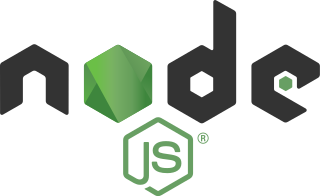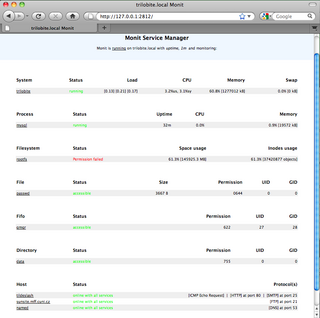Server-side scripting is a technique used in web development which involves employing scripts on a web server which produces a response customized for each user's (client's) request to the website. Scripts can be written in any of a number of server-side scripting languages that are available. Server-side scripting is distinguished from client-side scripting where embedded scripts, such as JavaScript, are run client-side in a web browser, but both techniques are often used together. The alternative to either or both types of scripting is for the web server itself to deliver a static web page.

lighttpd is an open-source web server optimized for speed-critical environments while remaining standards-compliant, secure and flexible. It was originally written by Jan Kneschke as a proof-of-concept of the c10k problem – how to handle 10,000 connections in parallel on one server, but has gained worldwide popularity. Its name is a portmanteau of "light" and "httpd".

Ruby on Rails is a server-side web application framework written in Ruby under the MIT License. Rails is a model–view–controller (MVC) framework, providing default structures for a database, a web service, and web pages. It encourages and facilitates the use of web standards such as JSON or XML for data transfer and HTML, CSS and JavaScript for user interfacing. In addition to MVC, Rails emphasizes the use of other well-known software engineering patterns and paradigms, including convention over configuration (CoC), don't repeat yourself (DRY), and the active record pattern.
WEBrick is a Ruby library providing simple HTTP web servers. It uses basic access authentication and digest access authentication for different kinds of servers that it can create - HTTP based server, HTTPS server, proxy server and virtual-host server. Construction of several non-HTTP servers such as the Day Time Server which uses the Daytime Protocol rather than the HTTP is also facilitated by WEBrick. It is used by the Ruby on Rails and Padrino frameworks to test applications in a development environment as well as production mode for small loads. It is now a part of Ruby standard library.
Nginx is a web server that can also be used as a reverse proxy, load balancer, mail proxy and HTTP cache. The software was created by Russian developer Igor Sysoev and publicly released in 2004. Nginx is free and open-source software, released under the terms of the 2-clause BSD license. A large fraction of web servers use Nginx, often as a load balancer.
Heroku is a cloud platform as a service (PaaS) supporting several programming languages. As one of the first cloud platforms, Heroku has been in development since June 2007, when it supported only the Ruby programming language, but now also supports Java, Node.js, Scala, Clojure, Python, PHP, and Go. For this reason, Heroku is said to be a polyglot platform as it has features for a developer to build, run and scale applications in a similar manner across most of these languages. Heroku was acquired by Salesforce in 2010 for $212 million.
Phusion Passenger is a free web server and application server with support for Ruby, Python and Node.js. It is designed to integrate into the Apache HTTP Server or the nginx web server, but also has a mode for running standalone without an external web server. Phusion Passenger supports Unix-like operating systems, and is available as a gem package, as a tarball, or as native Linux packages.

Zed A. Shaw is a software developer best known for creating the Learn Code the Hard Way series of programming tutorials, as well as for creating the Mongrel web server for Ruby web applications. He is also well known for his polemical views on programming languages and communities.

Slowloris is a type of denial of service attack tool which allows a single machine to take down another machine's web server with minimal bandwidth and side effects on unrelated services and ports.

Node.js is a cross-platform, open-source JavaScript runtime environment that can run on Windows, Linux, Unix, macOS, and more. Node.js runs on the V8 JavaScript engine, and executes JavaScript code outside a web browser.

Monit is a free, open-source process supervision tool for Unix and Linux. With Monit, system status can be viewed directly from the command line, or via the native HTTP(S) web server. Monit is able to do automatic maintenance, repair, and run meaningful causal actions in error situations. Monit rose to popularity with Ruby on Rails and the Mongrel web server, because a tool was needed that could manage the many identical Mongrel processes that needed to be run to support a scalable Ruby on Rails site, and Monit was fairly uniquely suited for the needs of the Ruby on Rails community. Many popular Rails sites have used Monit, including Twitter and scribd.

Opa is an open-source programming language for developing scalable web applications.
Yeoman is an open source client-side scaffolding tool for web applications. Yeoman runs as a command-line interface written for Node.js and combines several functions into one place, such as generating a starter template, managing dependencies, running unit tests, providing a local development server, and optimizing production code for deployment.

HAProxy is a free and open source software that provides a high availability load balancer and reverse proxy for TCP and HTTP-based applications that spreads requests across multiple servers. It is written in C and has a reputation for being fast and efficient.

Ember.js is an open-source JavaScript web framework that utilizes a component-service pattern. It allows developers to create scalable single-page web applications by incorporating common idioms, best practices, and patterns from other single-page-app ecosystem patterns into the framework.

Webpack is a free and open-source module bundler for JavaScript. It is made primarily for JavaScript, but it can transform front-end assets such as HTML, CSS, and images if the corresponding loaders are included. Webpack takes modules with dependencies and generates static assets representing those modules.
Unicorn is a Rack HTTP server to serve Ruby web applications on UNIX environment. It is optimised to be used with nginx. It is based on now deprecated Mongrel 1.1.5 from 2008.
JsRender/JsViews is an open-source JavaScript library for writing single-page web applications using templates and the Model–view–viewmodel design pattern.

Deno is a runtime for JavaScript, TypeScript, and WebAssembly that is based on the V8 JavaScript engine and the Rust programming language. Deno was co-created by Ryan Dahl, who also created Node.js.











